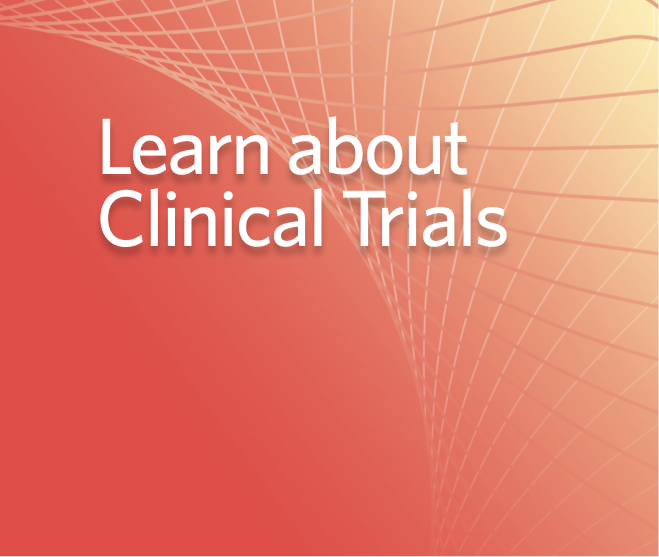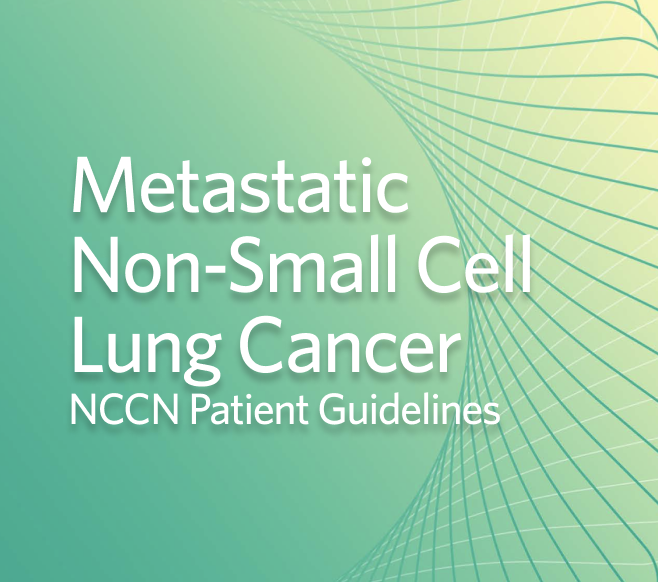
Show All
View and share any of these hopeful resources to help you navigate through your lung cancer journey.
 Nutrition and the Cancer Survivor
Nutrition and the Cancer Survivor  Cancer Survivorship
Cancer Survivorship
 When Cancer Returns
When Cancer Returns
Show All
Watch and learn directly from a few of the world’s leading medical experts in oncology. Meet the incredible doctors who are revolutionizing the game for lung cancer treatment every day by providing groundbreaking options that bring hope to the outlook ahead for lung cancer patients, and improve the quality of life for more long-term lung cancer survivors everywhere.
- Targeted Therapy Lung Cancer
- Immunotherapy Lung Cancer
- Chemotherapy Lung Cancer
Breakthroughs in treatment are providing new hope for lung cancer patients. Find inspiration from these NSCLC survivors as they share their personal experiences of the journey back to health.
- Tabitha NSCLC Stage IV Survivor
- Jeff NSCLC Stage IV Survivor
- Abby PD-L1 positive
- Maria Non-Small Cell Lung Cancer
- Marvin Chow NSCLC Stage IV Survivor
-
- Ablation therapy
- Nonsurgical treatment, generally using heat or extreme cold to remove or destroy cancer cells
-
- Adenocarcinoma
- A form of non-small cell lung cancer usually located at the outer edges of the lung
-
- Adjuvant therapy
- Treatment given after surgery or other types of treatment for more effective results
-
- Advance directive
- A legal document stating a person’s preferences if they cannot make their own decisions
-
- Afatinib
- Generic name for Gilotrif, a drug that targets EGFR-positive non-small cell lung cancer
-
- Alectinib
- Generic name for Alecensa, a drug that targets ALK-positive non-small cell lung cancer
-
- Alecensa
- Brand name for alectinib, a drug that targets ALK-positive non-small cell lung cancer
-
- ALK
- An acronym for naplastic lymphoma kinase, a gene and protein important to normal cell growth. A mutation of this gene, called the ALK rearrangement, leads to abnormal cell growth and is found in lung cancers, neuroblastoma and lymphoma. Can be identified by a biomarker test.
- Alternative Medicine
- A treatment that can be used instead of or along with standard medical treatment.
-
- Alternative, complementary or integrated therapy
- Non-standard therapy, often given along with traditional medicine, such as acupuncture, meditation or herbs
-
- Alunbrig
- Brand name for brigatinib, a drug that targets the ALK-positive non-small cell lung cancer
-
- Alveoli
- Tiny air sacs found at the end the bronchioles
-
- Amivantamab
- Generic name for Rybrevant™, a drug that targets EGFR-positive exon 20 non-small cell lung cancer
-
- Anti-angiogenesis therapy
- Treatment, used primarily in squamous cell non-small cell lung cancer, to prevent angiogenesis, a condition in which tumors grow and spread by creating new blood vessels.
-
- Atezolizumab
- Generic name for Tecentriq, an intravenous drug that targets PD-L1 non-small cell lung cancer.
-
- Biomarker testing
- A test to determine which biomarkers are present in a patient’s tumor. It is necessary to determine if there is a targeted treatment for that patient’s cancer.
-
- Biomarkers
- Genes, proteins, and other substances that identify the unique attributes a patient’s tumor — information relevant to targeted treatment, immunotherapies and other forms of personalized medicine
-
- Biopsy
- The removal of a small piece of tissue for laboratory examination to determine if an abnormality is caused by cancer
-
- Bone scan
- A small amount of radioactive material that allows a special camera to see bone structures not visible in an X-ray
-
- BRAF
- A gene that produces the B-Raf protein, which plays a role in normal cell growth. A BRAF mutation can cause a malfunction in cell signaling that can result in lung, thyroid, ovarian and colon cancers, and melanomas. Can be identified by a biomarker test.
-
- Brigatinib
- Generic name for Alunbrig, a drug that targets the ALK-positive non-small cell lung cancer
-
- Bronchioles
- Tiny lung airways that branch out from the main airways, called bronchi
-
- Bronchoscopy
- A bronchoscope, or flexible tube, inserted through the nose mouth to large airways of the lungs helps a doctor see tumors or take tissue samples to see if there are any cancer cells
-
- Bronchus
- One of two airways that branch from the trachea, or windpipe, to one of the lungs
-
- CAM
- An acronym for complementary and alternative medicine
-
- Cancer screening
- A way to check for cancer when there are no symptoms in order to catch the disease at an early stage when it is easier to cure. The recommended screening for lung cancer is a low-dose CT scan.
-
- Cancer survival rates
- The percentage of people who survive a certain type of cancer for a specific amount of time, usually five years
-
- Capillaries
- Tiny blood vessels that form networks throughout the body
-
- Carcinoma
- A cancer that starts in the epithelial tissue of the skin or of the lining of internal organs, such as the lung
-
- Carcinoma in situ (Stage 0 Cancer)
- Abnormal cells found in the place where they were formed, but which have not spread to surrounding tissue. They can, however, become cancerous and invasive.
-
- Carcinogen
- A substance know to cause cancer, such as asbestos, radon and tobacco
-
- Cemiplimab
- Generic name for Libtayo, an intravenous drug that targets PD-L1 non-small cell lung cancer
-
- Ceritinib
- Generic name for Zykadia, a drug that targets ALK-positive non-small cell lung cancer
-
- Chemotherapy
- A drug or combination of drugs that travel throughout the body to destroy, stop or slow the growth of cancer throughout the body
-
- Chromosomes
- Structures in a cell that contain DNA and genes. (See also DNA and genes)
-
- Cilia
- Tiny hairs that keep your lungs healthy by clearing fluids and foreign particles out of the airways
-
- Clinical Trial
- A research study to evaluate a new drug, treatment or medical device, and can sometimes provide an alternative when other treatments have failed
-
- Combined modality
- Also called multimodality, it means treating cancer with a combination of two or more therapies.
-
- Complementary Therapy
- A non-standard therapy, such as acupuncture, meditation or herbs, given along with standard medical treatment
-
- Crizotinib
- Generic name for Xalkori, a drug that targets ALK-positive and ROS1-positive non-small cell lung cancer
-
- Cryotherapy
- A procedure that kills tumor cells with extreme cold
-
- CT scan (computed tomography/CAT scan)
- A complex type of X-ray that combines multiple images to give detailed picture of the area being scanned
-
- Dabrafenib
- Generic name for Tafinlar, a drug that targets BRAF-positive non-small cell lung cancer
-
- Dacomitinib
- Generic name for Vizimpro, a drug that targets EGFR-positive non-small cell lung cancer
-
- DNA (deoxyribonucleic acid)
- Molecules found in chromosomes that transmit genetic information from one generation to the next. Some DNA mutations can cause cancer, and testing for genetic markers can sometimes predict the likelihood of certain cancers (see also genes and chromosomes).
-
- Durvalumab
- Generic name for Imfinzi, an intravenous drug that targets PD-L1 non-small cell lung cancer
-
- EGFR
- An acronym for epidermal growth factor receptor, a gene and a protein involved in cell growth. A mutation can cause out-of-control cell growth and lead to cancer. Variations in EGFR-positive cancers are called exon 19, 20 and 21. Can be identified by a biomarker test
-
- Endobronchial ultrasound (EBUS)
- A lighted, flexible tube, inserted through the windpipe, uses ultrasound waves to examine lymph nodes and other structures in the chest (similar to endoscopic esophageal ultrasound).
-
- Endocannabinoids
- A substance found naturally in the body related to cannabis, the scientific name for marijuana, that may have potential for fighting cancer
-
- Entrectinib
- Generic name for Rozlytrek™, a drug that targets NTRK-positive and ROS1-positive non-small cell lung cancer
-
- Erlotinib
- Generic name for Tarceva, a drug that targets EGFR-positive non-small cell lung cancer
-
- First-line therapy
- The first therapy given when cancer treatment begins.
-
- Gavreto™
- Brand name for pralsetinib, a drug that targets RET-positive non-small cell lung cancer.
-
- Gefitinib
- Generic name for Iressa, a drug that targets EGFR-positive non-small cell lung cancer.
-
- Genes
- Segments of DNA involved in regulating the function of specific cells. Certain gene mutations can cause cancer. (See also DNA and chromosomes)
-
- Gilotrif
- Brand name for afatinib, a drug that targets EGFR-positive non-small cell lung cancer.
-
- Guidelines
- Guidelines are created by experts to help doctors choose the best treatment plan for a patient.
-
- HER2
- An acronym for human epidermal growth factor receptor 2, a protein involved in normal cell growth. A mutation can cause an excess of the protein, leading to abnormal cell growth and cancer. The mutation is found in lung and other cancers, most commonly breast cancer. Can be identified by a biomarker test.
-
- Hospice
- A system of care — at home or at a hospice facility — for people with a short life expectancy after cancer treatment has been discontinued
-
- Hyperthermia
- A treatment using non-invasive ultrasound to heat cancer tumors to improve the effectiveness of chemotherapy or radiation
-
- Imfinzi
- Brand name for curvalumab, an intravenous drug that targets PD-L1 non-small cell lung cancer
-
- Immunotherapy
- A treatment that activates your body’s own immune system so that it can recognize and destroy cancer cells
-
- Integrated therapy
- The term for complementary and alternative medicine (CAM), given along with standard medical treatment
-
- Ipilimumab
- Generic name for Yervoy, an intravenous drug, used in combination with nivolumab (Opdivo) to target PD-L1 non-small cell lung cancer
-
- Iressa
- Brand name for gefitinib, a drug that targets EGFR-positive non-small cell lung cancer
-
- KRAS
- An acronym for Kirsten rat sarcoma viral oncogene homolog, a gene and a protein involved in controlling cell growth. A mutation can lead to abnormal cell growth and is found in lung, colorectal and pancreatic cancers. Can be identified by a biomarker test.
-
- Large cell (undifferentiated) carcinoma
- The least-common form of non-small cell lung cancer, it can spread faster than other types of NSCLCs.
-
- Larotrectinib
- Generic name for Vitrakvi, a drug that targets NTRK-positive non-small cell lung cancer.
-
- Lobe
- Both lungs are divided into lobes, three in the right lung and two in the left.
-
- Lobectomy
- The removal of a lobe in the lung.
-
- Lorbrena
- Brand name for lorlatinib, a drug that targets ALK-positive non-small cell lung cancer.
-
- Lorlatinib
- Generic name for Lorbrena, a drug that targets ALK-positive non-small cell lung cancer.
-
- Lumakras™
- Brand name for sotorasib, a drug that targets one type of KRAS-positive non-small cell lung cancer, KRAS G12C.
-
- Lymph/lymphatic fluid
- A part of the immune system that circulates throughout the body to remove foreign substances, which are then filtered out by the lymph nodes.
-
- Malignant
- A term that refers to the out-of-control cell growth that defines cancer
-
- Mediastinoscopy and mediastinotomy
- Tests using samples of lymph nodes located in the mediastinum, the area between the lungs
-
- Mekinist
- Brand name for trametinib, a drug that targets BRAF-positive non-small cell lung cancer
-
- MET
- An acronym for mesenchymal epithelial transition gene, which produces a protein that plays a role in cell growth and signaling. A mutation causes abnormal cell growth and can be found in lung, liver, kidney, head and neck cancers. Can be identified by a biomarker test.
-
- Metastasis
- A term describing cancer that has spread from the site of the primary tumor to other parts of the body
-
- Monoclonal antibodies
- A type of laboratory-made protein that can bind to specific antigens on the surface of cancerous cells and destroy them
-
- MRI scan (magnetic resonance imaging)
- MRI scans using radio waves and powerful magnets to find the location of tumors and cancer metastases
-
- Multimodality
- Also called combined modality, it means treating cancer with a combination of two or more therapies.
-
- Mutation
- A permanent change in the DNA sequence of a gene, some of which cause abnormal cell growth
-
- NSCLC (Non-Small Cell Lung Cancer)
- The most common form of lung cancer, whose primary types are adenocarcinoma, squamous cell carcinoma and large-cell carcinoma.
-
- Necitumumab
- Generic name for Portrazza, a drug that targets EGFR-positive squamous cell non-small cell lung cancer.
-
- Neoadjuvant therapy
- Treatment given before the primary treatment.
-
- Nivolumab
- Generic name for Opdivo, an intravenous drug that targets PD-L1 non-small cell lung cancer.
-
- NTRK
- An s for neurotrophic tyrosine receptor kinase, a gene that can mutate by fusing to another gene, creating proteins that cause abnormal cell grown and is found in lung, colorectal, soft tissue, head, neck, thyroid and brain cancers. Can be identified by abiomarker test.
-
- Occult stage non-small cell lung cancer
- The stage where cancer cells are found in sputum or mucus from the lung, but a tumor hasn’t been found or is too small for a biopsy.
-
- Opdivo
- Brand name for nivolumab, an intravenous drug that targets PD-L1 non-small cell lung cancer.
-
- Osimertinib
- Generic name for Tagrisso, a drug that targets EGFR-positive non-small cell lung cancer.
-
- Palliative care
- Care administered to ease pain and improve a patient’s quality of life at any point in the cancer journey, and often as part of hospice care (see palliative therapy).
-
- Partial response
- The tumor has decreased in size by 30% or more.
-
- Pathologist
- A physician who studies cells and tissues under a microscope to reveal the presence of disease.
-
- PD-L1
- An acronym for programmed cell death ligand 1, a protein that plays a role in the immune system. At normal levels, it prevents the immune system from attacking healthy cells, the cause of autoimmune disease. When PD-L1 fuses to a PD1 receptor, it prevents the body from killing cancer cells and can cause cancer.
-
- PET scan (positron emission tomography)
- A form of imagining that uses radioactive sugar to detect cancer, based on the fact that cancer cells absorb much more sugar than other cells.
-
- Photodynamic therapy (PDT)
- A treatment using a chemical that is activated by a laser to kill cancer cells.
-
- Placebo
- A substance that has no medical effect, used as control when testing new drugs.
-
- Pleura
- Two membranes that surround each lung and separate it from the chest wall.
-
- Pneumonectomy
- The surgical removal of an entire lung.
-
- Portrazza
- Brand name for necitumumab, a drug that targets EGFR-positive squamous cell non-small cell lung cancer.
-
- Power of attorney
- A legal document in which a patient gives another person the right to make decisions on their behalf.
-
- Pralsetinib
- Generic name for Gavreto™, a drug that targets RET-positive non-small cell lung cancer.
-
- Prognosis
- A medical prediction of the most likely course and outcome of a disease.
-
- Progressive disease
- A tumor that resists treatment and continues to grow.
-
- Radiation therapy
- High-dose electromagnetic waves that can be used at various stages of cancer and for several purposes: to cure cancer, boost the effectiveness of other treatments, reduce tumor size before surgery, prevent cancer from recurring or ease pain.
-
- Radiation therapy (external)
- A radiotherapy machine focuses an electromagnetic beam at the tumor, while sparing nearby tissue.
-
- Radiation therapy (internal)
- Radiation treatment delivered internally by placing radioactive material in or near the tumor.
-
- Radiofrequency ablation
- A treatment using thermal energy, or heat, to kill cancer.
-
- RET
- An acronym for rearranged during transfection, a gene that plays a role in cell signaling, A mutation or malfunction in RET signaling can result in lung and thyroid cancers. Can be identified by a biomarker test.
-
- Retevmo™
- Brand name for selpercatinib, a drug that targets RET-positive non-small cell lung cancer.
-
- Robotic Assisted Surgery
- A minimally invasive surgical procedure that requires only a small incision to insert a high-definition video camera and instruments into the chest cavity. The surgeon, seated in a console at bedside, then uses a control panel to direct a robotic surgeon’s movements.
-
- ROS1
- An acronym for c-ros oncogene 1, a gene that plays a role in cell growth and signaling. When it fuses to another gene it’s called an ROS1 rearrangement it can result in abnormal cell growth and lung, colorectal, stomach, ovarian, bile duct, and brain cancers. Can be identified by a biomarker test.
-
- Rozlytrek™
- Brand name for entrectinib, a drug that targets NTRK-positive and ROS1-positive non-small cell lung cancer.
-
- Rybrevant™
- Brand name for amivantamab, a drug that targets EGFR-positive exon 20 non-small cell lung cancer.
-
- SCLC (Small Cell Lung Cancer)
- Lung cancers, often fast-spreading, characterized by small cells and comprising only 10 to 15 percent of all lung cancers.
-
- Second-line therapy
- A treatment given when the first-line treatment has failed.
-
- Selpercatinib
- Generic name for Retevmo™, a drug that targets RET-positive non-small cell lung cancer.
-
- Sleeve resection (sleeve lobectomy)
- Surgery that saves part of the lung by removing only the tumor in a lobe and section of the bronchus.
-
- Sotorasib
- Generic name for Lumakras™, a drug that targets one type of KRAS-positive non-small cell lung cancer, KRAS G12C.
-
- Sputum cytology
- The use of a microscope to detect cancer cells in a sample of sputum, the mucus coughed up from the lungs.
-
- Squamous cell carcinoma
- A form of non-small cell lung cancer that usually starts in the flat cells lining the airways.
-
- Stable disease
- A tumor whose size hasn’t changed.
-
- Tafinlar
- Brand name for dabrafenib, a drug that targets BRAF-positive non-small cell lung cancer
-
- Tagrisso
- Brand name for osimertinib, a drug that targets EGFR-positive non-small cell lung cancer
-
- Tarceva
- Brand name for erlotinib, a drug that targets EGFR-positive non-small cell lung cancer
-
- Targeted therapy
- A type of personalized, precision treatment that targets specific cell abnormalities in a tumor, with little or no harm to surrounding tissue. It can be used alone or with other treatments. A biomarker test is necessary to determine if targeted treatment is possible.
-
- Tecentriq
- Brand name for atezolizumab, an intravenous drug that targets PD-L1 non-small cell lung cancer
-
- Thoracentesis
- A needle inserted between the ribs to draw fluid from the lungs, which is then checked for cancer cells
-
- Thoracoscopy
- A method of inserting a video camera into the space between the lungs and chest wall to locate small tumors, take tissue samples or remove early-stage cancers
-
- Thoracotomy
- An open chest procedure in which the ribs are spread apart so that the surgeon can access the lungs
-
- Trametinib
- Generic name for Mekinist, a drug that targets BRAF-positive non-small cell lung cancer
-
- Tumor
- An abnormal growth of body tissue
-
- Vaccine therapy
- A vaccine developed from tumor cells that, when injected, can help the immune system recognize and attack the cancer cells
-
- Video-assisted thoracic surgery (VATS)
- A minimally invasive surgical procedure that requires only a small incision to insert into the chest cavity a video camera and surgical instruments, which the surgeons wields directly
-
- Vitrakvi
- Brand name for larotrectinib, drug that targets NTRK-positive non-small cell lung cancer
-
- Vizimpro
- Brand name for cacomitinib, a drug that targets EGFR-positive non-small cell lung cancer
-
- Wedge resection
- Surgical removal of a triangle shaped section of the lung, that includes a tumor and a small amount of healthy tissue
-
- Xalkori
- Brand name for crizotinib, a drug that targets ALK-positive and ROS1-positive non-small cell lung cancer
-
- X-ray
- Often the first test used to detect lung cancer, which generally appears as a white or grey mass
-
- Yervoy
- Brand name for ipilimumab, an intravenous drug, used in combination with nivolumab (Opdivo) to target PD-L1 non-small cell lung cancer
-
- Zykadia
- Brand name for ceritinib, a drug that targets ALK-positive non-small cell lung cancer














